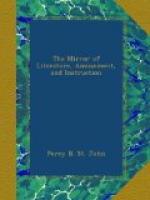“Ay, indeed!” said Molly, with a groan of sympathy; “oh the whiskey! if men could keep from it!”
“And if women could!” said Mr. Crofton in a low voice.
The Englishwoman looked up at him, and then looked down, refraining from assent to his smile.
“My mother-in-law,” continued she, “was very koind to me all along, as far as she could. But one thing she could not do; that was, to pay me back the money of husband’s and mine that I lent her. I thought this odd of her—and hard. But then I did not know the ways of the country in regard to never paying debts.”
“Sure it’s not the ways of all Ireland, my dear,” said Molly; “and it’s only them that has not that can’t pay—how can they?”
“I don’t know—it’s not for me to say,” said the Englishwoman, reservedly; “I am a stranger. But I thought if they could not pay me, they need not have kept a jaunting-car.”
“Is it a jaunting-car?” cried Molly. She pushed from her the chair on which she was leaning—“Jaunting-car bodies! and not to pay you!—I give them up intirely. Ill-used you were, my poor Mrs. Dermody—and a shame! and you a stranger! But them were Connaught people. I ask your pardon—finish your story.”
“It is finished, ma’am. They were ruined, and all sold; and I could not stay with my children to be a burthen. I wrote to husband, and he wrote me word to make my way to Dublin, if I could, to a cousin of his in Pill-lane—here’s the direction—and that if he can get leave from his colonel, who is a good gentleman, he will be over to settle me somewhere, to get my bread honest in a little shop, or some way. I am used to work and hardship; so I don’t mind. Brian was very koind in his letter, and sent me all he had—a pound, ma’am—and I set out on my journey on foot, with the three children. The people on the road were very koind and hospitable indeed; I have nothing to say against the Irish for that; they are more hospitabler a deal than in England, though not always so honest. Stranger as I was, I got on very well till I came to the little village here hard by, where my poor boy that is gone first fell sick of the measles. His sickness, and the ‘pot’ecary’ stuff and all, and the lodging and living ran me very low. But I paid all, every farthing; and let none know how poor I was, for I was ashamed, you know, ma’am, or I am sure they would have helped me, for they are a koind people, I will say that for them, and ought so to do, I am sure. Well, I pawned some of my things, my cloak even, and my silk bonnet, to pay honest; and as I could not do no otherwise, I left them in pawn, and, with the little money I raised, I set out forwards on my road to Dublin again, so soon as I thought my boy was able to travel. I reckoned too much upon his strength. We had got but a few miles from the village when he dropped, and could not get on; and I was unwilling and ashamed to turn back, having so little to pay for lodgings.




